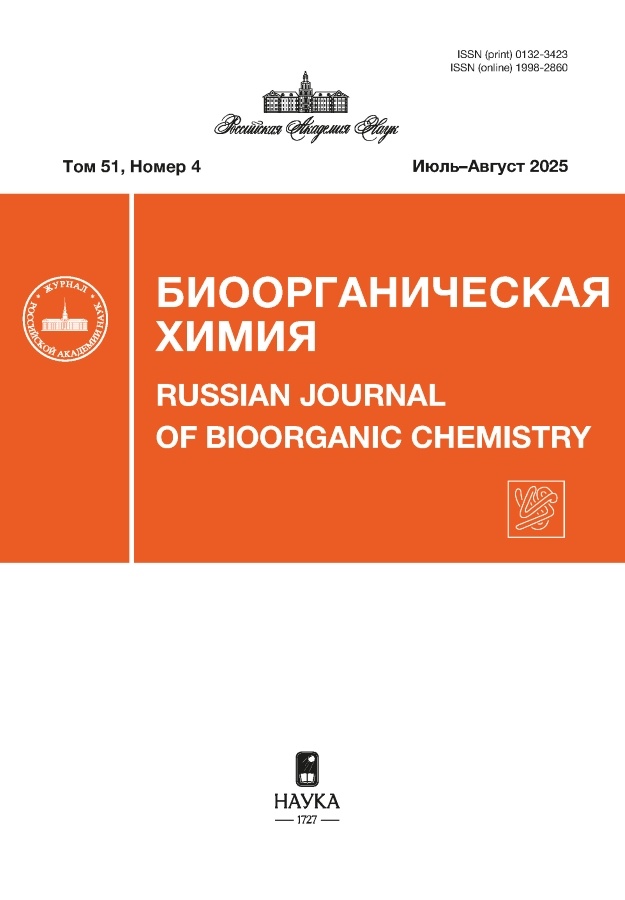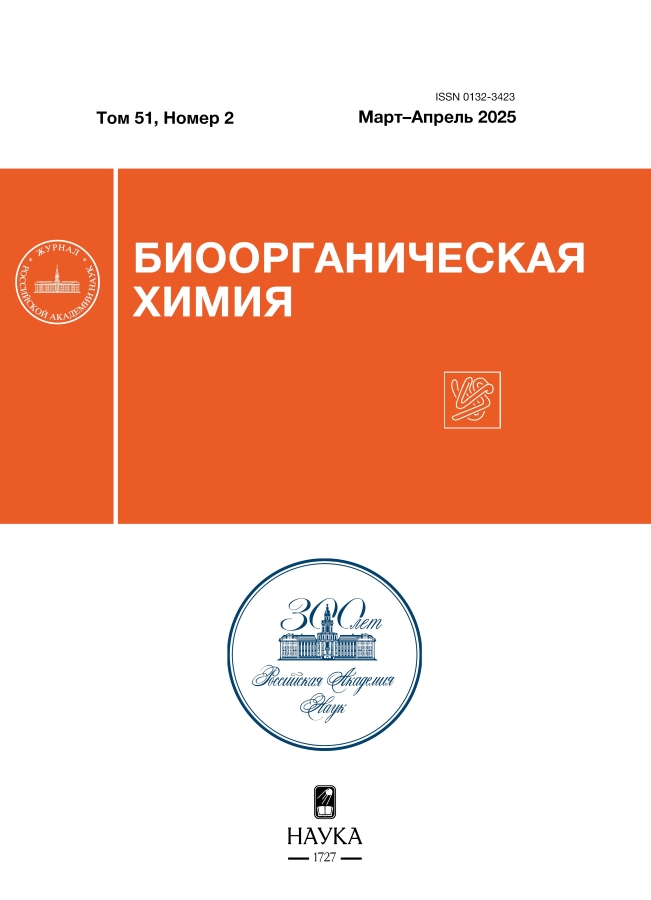Полиоксониобат платины: стабильность, цитотоксичность и поглощение клетками
- Авторы: Юдкина А.В.1,2, Вохтанцев И.П.1, Рычков Д.А.2,3, Волчек В.В.4, Абрамов П.А.4, Соколов М.Н.4, Жарков Д.О.5
-
Учреждения:
- Институт химической биологии и фундаментальной медицины СО РАН
- ЦКП “Сибирский кольцевой источник фотонов” ФИЦ “Институт катализа СО РАН”
- Институт химии твердого тела и механохимии СО РАН
- Институт неорганической химии им. А.В. Николаева СО РАН
- Новосибирский национальный исследовательский государственный университет
- Выпуск: Том 51, № 2 (2025)
- Страницы: 362-371
- Раздел: Статьи
- URL: https://innoscience.ru/0132-3423/article/view/682753
- DOI: https://doi.org/10.31857/S0132342325020141
- EDN: https://elibrary.ru/LBFJNY
- ID: 682753
Цитировать
Полный текст
Аннотация
Полиоксометаллаты платины – комплексы Pt (IV), содержащие объемные кластерные лиганды. Ранее было показано, что полиоксониобат платины структуры [(Nb6O19)2{Pt(OH)2}2]12− (Pt-PON1), содержащий два платиновых центра, способен образовывать ковалентный конъюгат с ДНК. В настоящей работе исследована структурная стабильность Pt-PON1 и его конъюгата с гуанином по положению N7, цитотоксичность этого соединения и его накопление клетками. Квантово-механическое моделирование показало, что комплекс Pt-PON1 нестабилен вне кристаллической решетки, а его конъюгат с гуанином должен достаточно легко претерпевать структурную перестройку. Наблюдалось значительное снижение выживаемости Escherichia coli штаммов XL1-Blue и DH5α и клеток человека линий HEK293T и MCF-7 в присутствии Pt-PON1 уже в концентрации 20 мкМ, однако при более высоких концентрациях соединение было малорастворимо в биологически совместимых средах. Методом атомно-эмиссионной спектроскопии по Pt и Nb показано, что Pt-PON1 эффективно поглощается клетками человека в стехиометрии, соответствующей исходному комплексу. Таким образом, полиоксометаллаты платины при условии решения проблемы растворимости могут рассматриваться как перспективные противоопухолевые агенты.
Ключевые слова
Полный текст
Об авторах
А. В. Юдкина
Институт химической биологии и фундаментальной медицины СО РАН; ЦКП “Сибирский кольцевой источник фотонов” ФИЦ “Институт катализа СО РАН”
Автор, ответственный за переписку.
Email: ayudkina@niboch.nsc.ru
Россия, 630090 Новосибирск, просп. Академика Лаврентьева, 8; 630559, Новосибирская обл., р.п. Кольцово, Никольский просп., 1
И. П. Вохтанцев
Институт химической биологии и фундаментальной медицины СО РАН
Email: ayudkina@niboch.nsc.ru
Россия, 630090 Новосибирск, просп. Академика Лаврентьева, 8
Д. А. Рычков
ЦКП “Сибирский кольцевой источник фотонов” ФИЦ “Институт катализа СО РАН”; Институт химии твердого тела и механохимии СО РАН
Email: ayudkina@niboch.nsc.ru
Россия, 630559, Новосибирская обл., р.п. Кольцово, Никольский просп., 1; 630128 Новосибирск, ул. Кутателадзе, 18
В. В. Волчек
Институт неорганической химии им. А.В. Николаева СО РАН
Email: ayudkina@niboch.nsc.ru
Россия, 630090 Новосибирск, просп. Академика Лаврентьева, 3
П. А. Абрамов
Институт неорганической химии им. А.В. Николаева СО РАН
Email: ayudkina@niboch.nsc.ru
Россия, 630090 Новосибирск, просп. Академика Лаврентьева, 3
М. Н. Соколов
Институт неорганической химии им. А.В. Николаева СО РАН
Email: ayudkina@niboch.nsc.ru
Россия, 630090 Новосибирск, просп. Академика Лаврентьева, 3
Д. О. Жарков
Новосибирский национальный исследовательский государственный университет
Email: ayudkina@niboch.nsc.ru
Россия, 630090 Новосибирск, ул. Пирогова, 2
Список литературы
- Kelland L. // Nat. Rev. Cancer. 2007. V. 7. P. 573–584. https://doi.org/10.1038/nrc2167
- Dasari S., Tchounwou P.B. // Eur. J. Pharmacol. 2014. V. 740. P. 364–378. https://doi.org/10.1016/j.ejphar.2014.07.025
- Wheate N.J., Walker S., Craig G.E., Oun R. // Dalton Trans. 2010. V. 39. P. 8113–8127. https://doi.org/10.1039/c0dt00292e
- Apps M.G., Choi E.H.Y., Wheate N.J. // Endocr. Relat. Cancer. 2015. V. 22. P. R219–R233. https://doi.org/10.1530/ERC-15-0237
- Hu X., Li F., Noor N., Ling D. // Sci. Bull. 2017. V. 62. P. 589–596. https://doi.org/10.1016/j.scib.2017.03.008
- Li X., Liu Y., Tian H. // Bioinorg. Chem. Appl. 2018. V. 2018. P. 8276139. https://doi.org/10.1155/2018/8276139
- Gibson D. // J. Inorg. Biochem. 2021. V. 217. P. 111353. https://doi.org/10.1016/j.jinorgbio.2020.111353
- Marotta C., Giorgi E., Binacchi F., Cirri D., Gabbiani C., Pratesi A. // Inorg. Chim. Acta. 2023. V. 548. P. 121388. https://doi.org/10.1016/j.ica.2023.121388
- Aher S., Zhu J., Bhagat P., Borse L., Liu X. // Top. Curr. Chem. 2024. V. 382. P. 6. https://doi.org/10.1007/s41061-023-00448-3
- Rhule J.T., Hill C.L., Judd D.A., Schinazi R.F. // Chem. Rev. 1998. V. 98. P. 327–358. https://doi.org/10.1021/cr960396q
- Hasenknopf B. // Front. Biosci. 2005. V. 10. P. 275–287. https://doi.org/10.2741/1527
- Van Rompuy L.S., Parac-Vogt T.N. // Curr. Opin. Biotechnol. 2019. V. 58. P. 92–99. https://doi.org/10.1016/j.copbio.2018.11.013
- Shigeta S., Mori S., Yamase T., Yamamoto N., Yamamoto N. // Biomed. Pharmacother. 2006. V. 60. P. 211–219. https://doi.org/10.1016/j.biopha.2006.03.009
- Wang S., Sun W., Hu Q., Yan H., Zeng Y. // Bioorg. Med. Chem. Lett. 2017. V. 27. P. 2357–2359. https://doi.org/10.1016/j.bmcl.2017.04.025
- Bijelic A., Aureliano M., Rompel A. // Chem. Commun. 2018. V. 54. P. 1153–1169. https://doi.org/10.1039/c7cc07549a
- Gumerova N., Krivosudský L., Fraqueza G., Breibeck J., Al-Sayed E., Tanuhadi E., Bijelic A., Fuentes J., Aureliano M., Rompel A. // Metallomics. 2018. V. 10. P. 287–295. https://doi.org/10.1039/c7mt00279c
- Yanagie H., Ogata A., Mitsui S., Hisa T., Yamase T., Eriguchi M. // Biomed. Pharmacother. 2006. V. 60. P. 349–352. https://doi.org/10.1016/j.biopha.2006.06.018
- Bijelic A., Aureliano M., Rompel A. // Angew. Chem. Int. Ed. 2019. V. 58. P. 2980–2999. https://doi.org/10.1002/anie.201803868
- Zhao M., Chen X., Chi G., Shuai D., Wang L., Chen B., Li J. // Inorg. Chem. Front. 2020. V. 7. P. 4320–4332. https://doi.org/10.1039/D0QI00860E
- Gao N., Sun H., Dong K., Ren J., Duan T., Xu C., Qu X. // Nat. Commun. 2014. V. 5. P. 3422. https://doi.org/10.1038/ncomms4422
- Yang H.-K., Cheng Y.-X., Su M.-M., Xiao Y., Hu M.-B., Wang W., Wang Q. // Bioorg. Med. Chem. Lett. 2013. V. 23. P. 1462–1466. https://doi.org/10.1016/j.bmcl.2012.12.081
- Fu L., Gao H., Yan M., Li S., Li X., Dai Z., Liu S. // Small. 2015. V. 11. P. 2938–2945. https://doi.org/10.1002/smll.201500232
- Sun T., Cui W., Yan M., Qin G., Guo W., Gu H., Liu S., Wu Q. // Adv. Mater. 2016. V. 28. P. 7397–7404. https://doi.org/10.1002/adma.201601778
- Abramov P.A., Vicent C., Kompankov N.B., Gushchin A.L., Sokolov M.N. // Chem. Commun. 2015. V. 51. P. 4021–4023. https://doi.org/10.1039/C5CC00315F
- Yudkina A.V., Sokolov M.N., Abramov P.A., Grin I.R., Zharkov D.O. // Russ. J. Bioorg. Chem. 2019. V. 45. P. 641–646. https://doi.org/10.1134/S1068162019060414
- Wang D., Lippard S.J. // Nat. Rev. Drug Discov. 2005. V. 4. P. 307–320. https://doi.org/10.1038/nrd1691
- Stewart J.J.P. // MOPAC2016. Colorado Springs: Stewart Computational Chemistry, 2016.
- Mardirossian N., Head-Gordon M. // Mol. Phys. 2017. V. 115. P. 2315–2372. https://doi.org/10.1080/00268976.2017.1333644
- Nichols R.J., Sen S., Choo Y.J., Beltrao P., Zietek M., Chaba R., Lee S., Kazmierczak K. M., Lee K.J., Wong A., Shales M., Lovett S., Winkler M.E., Krogan N.J., Typas A., Gross C.A. // Cell. 2011. V. 144. P. 143–156. https://doi.org/10.1016/j.cell.2010.11.052
- Garnett M.J., Edelman E.J., Heidorn S.J., Greenman C.D., Dastur A., Lau K.W., Greninger P., Thompson I.R., Luo X., Soares J., Liu Q., Iorio F., Surdez D., Chen L., Milano R.J., Bignell G.R., Tam A.T., Davies H., Stevenson J.A., Barthorpe S., Lutz S.R., Kogera F., Lawrence K., McLaren-Douglas A., Mitropoulos X., Mironenko T., Thi H., Richardson L., Zhou W., Jewitt F., Zhang T., O’Brien P., Boisvert J.L., Price S., Hur W., Yang W., Deng X., Butler A., Choi H.G., Chang J.W., Baselga J., Stamenkovic I., Engelman J.A., Sharma S.V., Delattre O., Saez-Rodriguez J., Gray N.S., Settleman J., Futreal P.A., Haber D.A., Stratton M.R., Ramaswamy S., McDermott U., Benes C.H. // Nature. 2012. V. 483. P. 570–575. https://doi.org/10.1038/nature11005
- Tusskorn O., Khunluck T., Prawan A., Senggunprai L., Kukongviriyapan V. // Biomed. Pharmacother. 2019. V. 111. P. 109–118. https://doi.org/10.1016/j.biopha.2018.12.051
- Santini M.T., Paradisi S., Straface E., Malorni W. // Cell Biol. Toxicol. 1993. V. 9. P. 295–306. https://doi.org/10.1007/BF00755607
- Kobayashi D., Kakinouchi K., Nagae T., Nagai T., Shimura K., Hazama A. // FEBS Lett. 2017. V. 591. P. 718–727. https://doi.org/10.1002/1873-3468.12579
- Welters M.J.P., Fichtinger-Schepman A.M.J., Baan R.A., Hermsen M.A.J.A., van der Vijgh W.J.F., Cloos J., Braakhuis B.J.M. // Int. J. Cancer. 1997. V. 71. P. 410–415. https://doi.org/10.1002/(SICI)1097-0215(19970502) 71:3<410::AID-IJC18>3.0.CO;2-J
- Frisch M.J., Trucks G.W., Schlegel H.B., Scuseria G.E., Robb M.A., Cheeseman J.R., Scalmani G., Barone V., Petersson G.A., Nakatsuji H., Li X., Caricato M., Marenich A., Bloino J., Janesko B.G., Gomperts R., Mennucci B., Hratchian H.P., Ortiz J.V., Izmaylov A.F., Sonnenberg J.L., Williams-Young D., Ding F., Lipparini F., Egidi F., Goings J., Peng B., Petrone A., Henderson T., Ranasinghe D., Zakrzewski V.G., Gao J., Rega N., Zheng G., Liang W., Hada M., Ehara M., Toyota K., Fukuda R., Hasegawa J., Ishida M., Nakajima T., Honda Y., Kitao O., Nakai H., Vreven T., Throssell K., Montgomery J.A., Jr., Peralta J.E., Ogliaro F., Bearpark M., Heyd J.J., Brothers E., Kudin K.N., Staroverov V.N., Keith T., Kobayashi R., Normand J., Raghavachari K., Rendell A., Burant J.C., Iyengar S.S., Tomasi J., Cossi M., Millam J.M., Klene M., Adamo C., Cammi R., Ochterski J.W., Martin R.L., Morokuma K., Farkas O., Foresman J.B., Fox D.J. // Gaussian 09, Revision D.01. Wallingford: Gaussian, Inc., 2016.
- Momma K., Izumi F. // J. Appl. Crystallogr. 2008. V. 41. P. 653–658. https://doi.org/10.1107/S0021889808012016
- van Meerloo J., Kaspers G.J.L., Cloos J. // Methods Mol. Biol. 2011. V. 731. P. 237–245. https://doi.org/10.1007/978-1-61779-080-5_20
- Gumerova N.I., Rompel A. // Nat. Rev. Chem. 2018. V. 2. P. 0112. https://doi.org/10.1038/s41570-018-0112
- Compain J.-D., Mialane P., Marrot J., Sécheresse F., Zhu W., Oldfield E., Dolbecq A. // Chemistry. 2010. V. 16. P. 13741–13748. https://doi.org/10.1002/chem.201001626
Дополнительные файлы
















